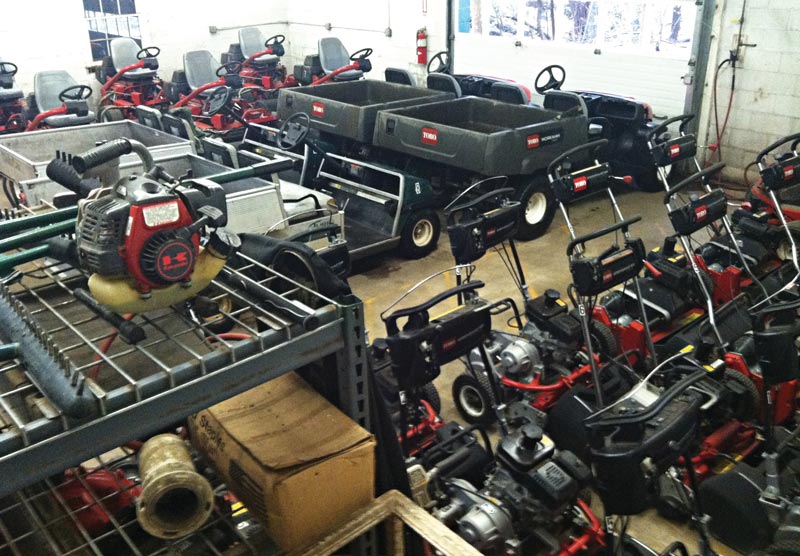
Whether you decide to buy or lease your golf course maintenance equipment, taking a long-range approach to your decision-making process will pay dividends for both your maintenance team and your facility. Photo courtesy of Chris Carson
Most superintendents fight hard to get the lowest price when they purchase maintenance equipment. Doing so is, of course, one of our most important duties, but I think that at times, the bigger picture gets missed when the focus is only on price.
Certainly the quality of the equipment and its ability to do the job are paramount, but there’s much more to the story. We should also know how long we expect to keep our equipment, the value of new technologies to our operation, our club’s cash flow and capital budget, and whether we have the people in place to maintain our machinery. These are important questions to answer during the budgeting process, and they help form our equipment management strategy, which is something that all superintendents should be able to communicate to their bosses.
Thoughtful superintendents take a long-term perspective when they make their purchase recommendations, integrating initial price with cost of maintenance, rate to borrow or lease, and the expected life span of the equipment. This focus on total cost of ownership shows our clubs that we have a deeper understanding of these critical decisions and that we have the business interests of our clubs in mind.
For example, if the average life span of a triplex greens mower is seven years, and you are consistently getting 15 quality years out of yours, your cost per year of ownership is significantly reduced, even when the expenses of maintenance and component replacement are included. This information can help you in your sales pitch to your club when equipment needs updating — when your club knows that you take good care of the equipment, it’ll be more inclined to say yes when you have a need.
If you want to lease equipment, you should be able to explain to your decision-makers why that’s a good strategy for your club. Coupled with an extended warranty, for example, leasing can mean that equipment is always covered by the manufacturer, and thus the equipment manager will be more responsible for maintenance than for refurbishing. Leasing comes with a cost, but it also guarantees the latest technology is in use at your facility, which can have a positive effect on the quality of your playing conditions.
At my club, we try to obtain full value from our equipment purchases, and we have two excellent mechanics who allow us to do just that. The life span of our purchases is typically two to three times the industry average, and, as a result, our cost per year of ownership is very low. There are some negatives to this strategy, including cumulative wear and a certain decline in function and reliability, but generally, it works at Echo Lake Country Club.
About five years ago, it became clear to me that a change in how we cut fairways was imminent. We had used triplex mowers since 1986, but after several on-site demonstrations, I was convinced that the newest generation of five-gang mowers was going to give us an improved quality of cut in addition to improved efficiency, which would free up some of our labor for other tasks. Given that several of our eight triplexes had reached the end of their life span, we knew we had to replace some of our fleet before making that significant change.
So, we found several used units that allowed us to replace tired equipment at a reduced price while also preserving capital for the eventual five-gang purchases. I took advantage of the discussions that took place during these three years to prepare the decision-makers at my club for the forthcoming request, and when we were ready to pull that trigger, we had effectively pre-sold the idea, and the request was met with a resounding “yes.” We sold six of the older triplexes, kept the two newer ones, and my club knew that the purchasing process was done thoughtfully and without waste.
Some of my peers take a different view, believing that having new equipment and the “next best thing” is desirable for their operations. Though they have a different purchase and maintenance philosophy than mine, they are able to sell their strategy to their club and explain why it is best for them, and that’s exactly what successful superintendents must be able to do.
Chris Carson is the GCSAA Class A superintendent at Echo Lake Country Club in Westfield, N.J., where he has worked for 30 years. He teaches courses on budgeting and professional development at the Rutgers Professional Golf Turf Management School. A 31-year member of GCSAA, Chris has served as president of both the GCSA of New Jersey and the New Jersey Turfgrass Association.